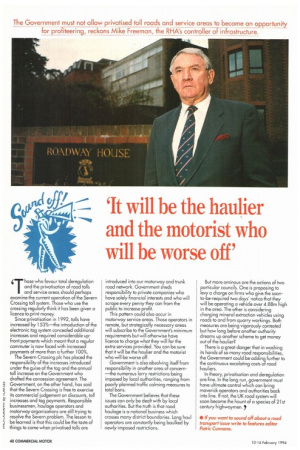'It will be the haulier and the motorist who will be worse off'
Page 42

If you've noticed an error in this article please click here to report it so we can fix it.
4 T
hose who favour total deregulation and the privatisation of road tolls and service areas should perhaps examine the current operation of the Severn Crossing toll system. Those who use the crossing regularly think it has been given a licence to print money. Since privatisation in 1992, tolls have increased by 153%—the introduction of the electronic tag system concealed additional increases and required considerable upfront payments which meant that a regular commuter is now faced with increased payments of more than a further 100%. The Severn Crossing plc has placed the responsibility of the increases introduced under the guise of the tag and the annual toll increase on the Government who drafted the concession agreement, The Government, on the other hand, has said that the Severn Crossing is free to exercise its commercial judgement on discounts, toll increases and tag payments. Responsible businessmen, haulage operators and motorway organisations are still trying to resolve the Severn problem. The lesson to be learned is that this could be the taste of things to come when privatised tolls are introduced into our motorway and trunk road network. Government sheds responsibility to private companies who have solely financial interests and who will scrape every penny they can from the public to increase profit. This pattern could also occur in motorway service areas. Those operators in remote, but strategically necessary areas will subscribe to the Government's minimum requirements but will otherwise have licence to charge what they will for the extra services provided. You can be sure that it will be the haulier and the motorist who will be worse off.
Government is also absolving itself from responsibility in another area of concern-the numerous lorry restrictions being imposed by local authorities, ranging from poorly planned traffic calming measures to total bans.
The Government believes that these issues can only be dealt with by local authorities. But the truth is that road haulage is a national business which crosses many district boundaries. Long haul operators are constantly being baulked by newly-imposed restrictions. But more ominous are the actions of two particular councils. One is proposing to le a charge on firms who give the soonto-be-required Iwo days' notice that they will be operating a vehicle over 4.88m high in the area. The other is considering charging mineral extraction vehicles using roads to and from quarry workings. Both measures are being vigorously contested but how long before another authority dreams up another scheme to get money out of the haulier?
There is a great danger that in washing its hands of so many road responsibjlities, the Government could be adding further to the continuous escalating costs of road hauliers.
In theory, privatisation and deregulation are fine. In the long run, government must have ultimate control which can bring maverick operators and authorities back into line. If not, the UK road system will soon become the haunt of a species of 21st century highwaymen.




















































































